1 Couple, 2 Shows
Spoiler: And 2 Dissenting Opinions
This week, I’m taking a slight tangent from the usual discussion of action figures as their tropes apply to writing.
Instead, I’m bringing a discussion here, I think in no small part because my wife isn’t interested in hearing me complain about it first thing in the morning when she just wants to drink her goddamn coffee in peace, thank you.1
Her loss is your gain.
There’s two series we started watching together, and two episodes into each I can already tell which one is working, and which one isn’t.
Our Two Contenders…
Your Friends & Neighbors (starring Jon Hamm2 and Amanda Peet) streams on Apple+. The Four Seasons (starring Tina Fey, Steve Carell, and Will Forte) streams on Netflix.3
Both series I had high hopes for, both of which feature actors I really enjoy.
I wasn’t a huge Mad Men guy, but I respect Jon Hamm. I actually prefer him in more villainous roles—I couldn’t even finish Fargo Season 5, I was so disturbed by Hamm’s portrayal of Roy Tillman, the local sheriff and abusive ex-husband of the main character, Dot. And I thought he was gr-r-reat in Baby Driver as Buddy, a former Wall Street exec turned to a life of crime… hey, wait just a goddamn minute!

Jon Hamm has range. He can play charming, he can play smarmy, you can play outright creepy and dangerous.
And Tiny Fey is on my Mount Rushmore of comedy writers. I was a big 30 Rock fan, and still don’t think I fully appreciated just how rare and good that show was, especially for network TV. I also enjoyed Unbreakable Kimmy Schmidt, in which Ellie Kemper plays the titular character freed from a basement-dwelling cult, after being held there by… wait, Jon Hamm again!?
WARNING: SPOILERS AHEAD…!!!
Your Friends & Neighbors
In this series, Jon Hamm plays (wait for it) a former Wall Street exec turning to a life of crime. Unlike in Baby Driver, where he needs to fuel his (and his wife’s) drug habit, here his character just needs to make ends meet. As Andrew Cooper, he’s lost his job under shady circumstances (he had an affair with a colleague, which wasn’t reported to HR but still used to leverage him out).
Between the two, Buddy is already a more compelling character.
My issue with the series is two-fold. First, his problems are very upper class, white collar problems (same with The Four Seasons, but we’ll get to that). Andrew Cooper still has savings. He’s divorced, but rents a house in the same tony suburb. And while he may be under a non-compete with his old company, he could still easily get another job (and is in fact quickly offered one, albeit as a big step down).
So what exactly are his pressures here? He needs to buy the very latest drum set for his teenage son so he can stay cool for his band. He needs to pay for tennis lessons for his teenage daughter so she can make the Princeton team.
You know, totally relatable money issues for the average viewer.
The stakes are set so low already. And for a series advertising itself as a crime drama, that’s kind of a problem.
It gets worse. Cooper’s divorced, but his wife still sorta misses him. Her affair partner wants them all to be friends. The colleague Cooper had an affair with is quickly made into his ally. And the other woman Cooper’s been having an ongoing affair with still wants him as well! Hell, even the housekeeper who catches him breaking and entering is quickly turned into another partner for him!
So… who is he up against?
I mean, I get it. Kinda. It’s Jon Hamm. I’d want to be his partner-in-crime, too. But with every female character in the series drawn to him so that it affects the plot, c’mon.
This relates to my second issue with the series, which is the lack of any meaningful (or worse, interesting) antagonists. The other figures in Cooper’s life—the former boss who orchestrated his firing, the corporate lawyer in the boss’s pocket—sure, they’re slimy, but they’re not exactly threatening in any real way. They’re hardly antagonists. They’re certainly not compelling. Even the local cops aren’t a danger to him as a thief. Cooper straight up answers the door in one of his first robberies, knowing as well-to-do white guy, he raises no concerns with being in any of these houses.
So if the stakes are low, the threats are even lower. And who am I supposed to be rooting for here anyway, a fallen Wall Street exec to regain his rightful place as “Master of the Universe” again? Is there schadenfreude watching some Real Housewives-types getting ripped off? Sure, but one of them can’t also be the thief.
Now, granted—if the series becomes more about Cooper’s descent into actual dangerous criminality (like with Breaking Bad), or faces opposition by true threats (like with Ozark), fantastic! But it sure doesn’t look headed in that direction, and I only have some many hours for viewing.
The Four Seasons
The other series we started, The Four Seasons, is based on the 1981 movie written, directed, and starring Alan Alda. In one scene of the series, he even makes a cameo, clearly thrilling Tina Fey for participating.4
Of course this series is more of a character piece, a rom-com farce of some kind. And yes, these are also upper class, white collar people having upper class, white collar problems. They’re at a vacation house on a lake. In one scene, Steve Carell’s wife has trouble getting back onto the boat he complains they don’t take out often enough.
So yeah… not exactly relatable issues for the average viewer here, either.
And yet, compared to Your Friends & Neighbors, the characters are far more enjoyable to simply be around, and so I already care far more about their problems as a viewer. And when it comes to their problems, I feel far more actual tension about the situation.
In these first two episodes Steve Carell seriously contemplates leaving his wife. Meanwhile she’s planning a surprise vow renewal, with their friends and family secretly attending. Up until the very last moment, I have no idea which way Steve Carell will finally commit.5
Unlike in Your Friends and Neighbors, I already feel like there are very real consequences for these characters in play. Granted the stakes may be comparatively “lower” then arrest and imprisonment: Will a marriage last? Can I tell my partner something without it becoming a fight? What happens if I haven’t told them the truth and it comes out? But by buying into the characters, giving them moments to seem real, flawed, and vulnerable, I’m more invested in following the choices they face and how they’ll navigate through them.
The Verdict
So, I’ve tried two episodes of each. And yes, I know they’re markedly different series, but if pitted directly against each other—then I’m quickly out on Your Friends & Neighbors, and definitely in on The Four Seasons. They both have great actors, but the difference is in the writing.
Which offers solid lessons to keep in mind for my own:
Do the characters feel real? Do they feel sympathetic (what about them makes us root for them)? At the same time, do they also feel sufficiently flawed?
What are the challenges for the main characters—what are their goals, and what’s preventing them from achieving them? Just as importantly as external factors, what about themselves is holding them back?
What are the consequences if they fail? Are we worried what happens next if they don’t succeed?
On that last point, do we even want to see what happens next? Do we care? That answer better be yes, or else that story’s finished.
As a character, Andrew Cooper maybe drinks a bit too much, and is not over the break-up of his marriage. But what are his real flaws here—pride, I guess? But as the protagonist, I don’t see him coming to any kind of self-realization, or conversely, an actual fall. And, maybe because of that, I don’t care. I know he’ll be fine one way or the other, even if he falls in a pool every so often escaping a guard dog, or only gets 40% of the value hocking whatever luxury watch he steals.
Boo fucking hoo.
Compared to that, I’ll take anything Tina Fey writes instead, in a heartbeat.
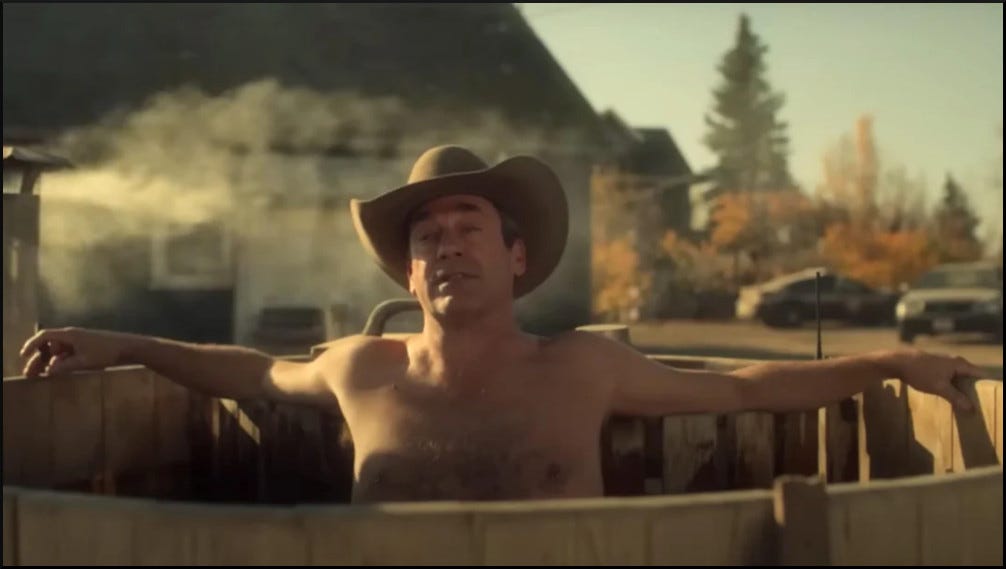
Next time: Back to drivers (and vehicles) as a trope to explore in writing.
I assume that’s what “Maybe you should go write a Substack post about this” actually means.
My brain really wants this to be spelled John Ham. And as a Carroll who’s needed to insist on two “r”s and two “l’s for anyone taking my name down at a doctor’s office or wherever, Steve “Carell” really troubles me as well.
Tragically, this is not about a hilariously incompetent press conference. I would definitely watch that docuseries as well, though.
And weirding me out by looking exactly, and I mean exactly, like my father in his later years.
Just like you have no idea the physical toll that three vasectomies have on a person!


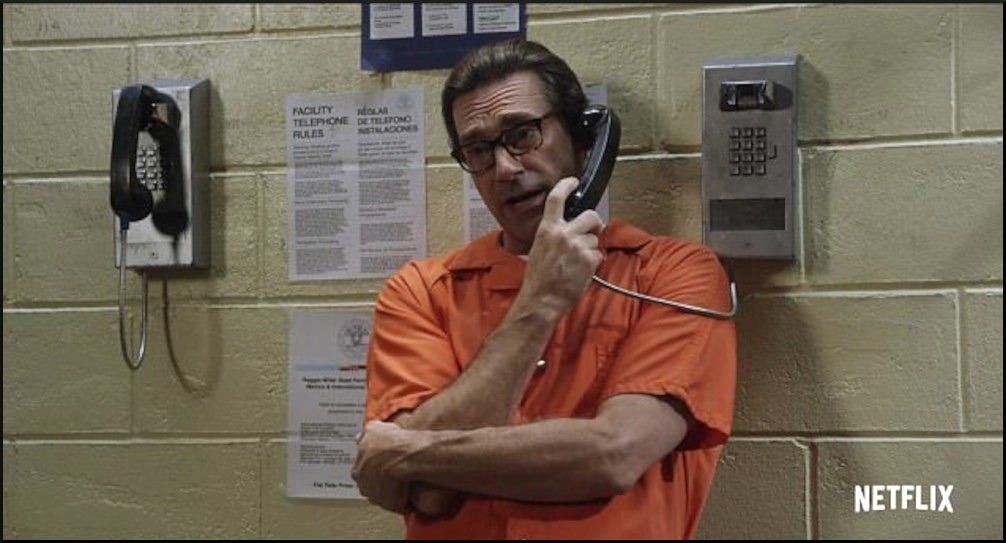
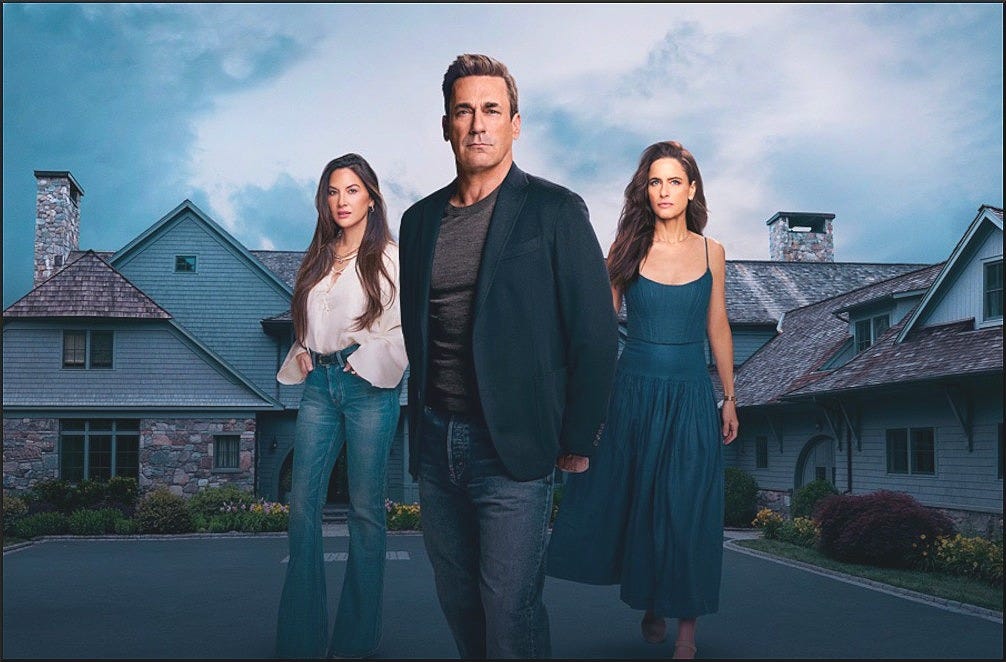
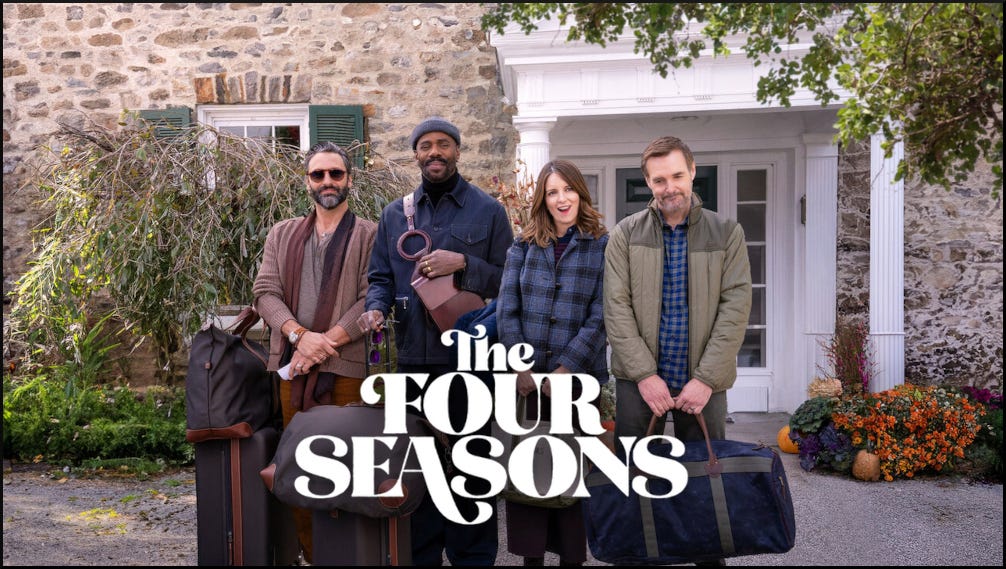
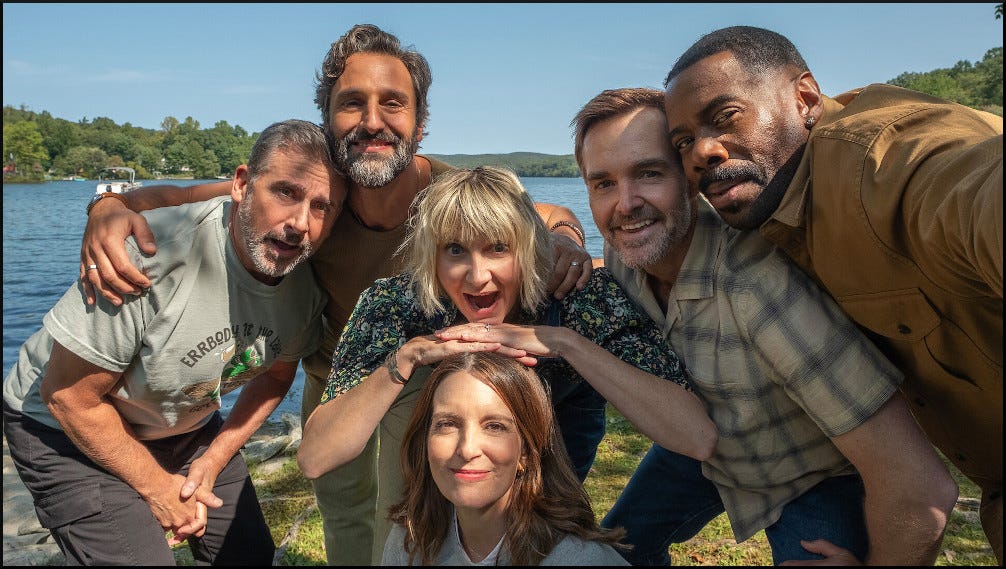
I stopped reading when I read that you hadn’t watched the end of Fargo season 5.
Before we go any further, you must.
It is worth it.
Oh man, is it satisfying.